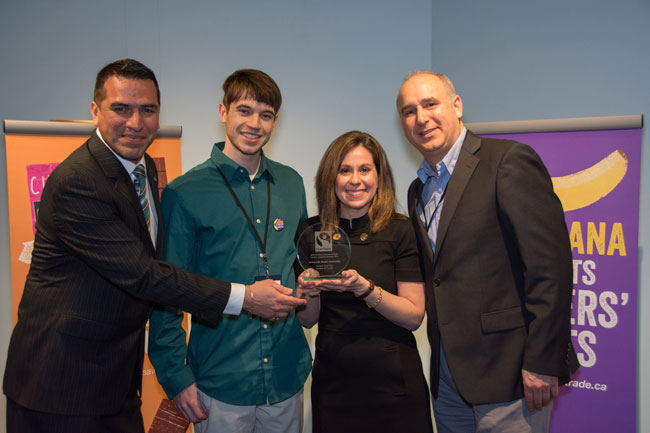
By McGill Reporter Staff and John Lindsay
At a ceremony in Halifax on February 25, McGill was named Fair Trade Campus of the Year by Fairtrade Canada, making us No. 1 among the 21 designated fair trade campuses across Canada. The award was granted by an independent panel of judges to the campus with the strongest commitment to fair trade.
“This award says that McGill is a leader in sustainability in Canada. As the fair trade movement continues to grow, especially at Canadian universities, McGill is happy to support and guide other institutions to make this smart, informed and ethical commitment to fair trade purchasing,” says John Lindsay, Food and Dining Sustainability Coordinator. “While we’re reading about doom and gloom for environmental sustainability in the news, McGill practitioners are actively making the world a better place through their fair trade commitment. It encourages the McGill community to do more to support the fair trade movement.”
The fair trade is a movement designed to empower smallholder farmers in the global South. By offering independent, third-party certification from international organizations based in the global North that share power equally (50 per cent) with producers in the global South, fair trade is not charity; it funds empowerment.
Fair trade guarantees two things for smallholder farmers: a minimum price; and a social premium. The minimum price ensures that if there is an oversupply of commodities (e.g. coffee) causing global prices to plummet, smallholder farmers will always get a pre-defined selling price no matter what the market price becomes. The social premium allocates funds from every unit of commodity sold directly to the producers and cooperatives themselves, ensuring community development the core of sustainable development.
At the same time, fair trade includes strong environmental standards that ensure communities in the global South can have long-term, sustainable food and commodity production.
With over $1M of fair trade goods sold on campus in 2015, McGill leads the country. McGill offers 100 per cent fair trade coffee, three fair trade tea options, and at least one fair trade chocolate option in all residence dining halls, non-franchised campus cafes, and the main on-campus service provider locations. Last year, the University served over 10,000 homemade fair trade chocolate Chip cookies and more than 12,000 homemade fair trade brownies.
Other McGill fair trade highlights include:
- Creating the world’s biggest fair trade brownie in 2014
- Establishing a Guinness World Record for the biggest Smoothie in 2015 using over 40 cases of fair trade organic bananas
- Launching our own organic fair trade coffee blend, Roddick Roast, on campus in 2016
- Recently opening the only fair trade Starbucks in the province and the second one in Canada
Monique Lauzon is a nutritionist and Marketing and Nutrition Counsellor with Student Housing and Hospitality Services. She says the unit is proud of this award and are planning a celebratory event in the Royal Victoria College’s Roscoe Lounge on Tuesday, April 4.
“What I like most about fair trade are the guaranteed fair wages for farmers and producers so it’s really the positive social and ethical impact it brings,” says Lauzon. “As a nutritionist, I also appreciate the fact that although not required, most fair trade products adhere to organic standards or are grown and produced according to environmentally responsible, sustainable practices. Our McGill Roddick Roast coffee, for example, is both fair trade and organic. Limiting the use of synthetic fertilizers and pesticides is both good for the planet and for our health.”
McGill received its Fair Trade Campus designation in 2013, the first such campus in Quebec, thanks to the collaboration between McGill Engineers Without Borders; McGill Student Housing and Hospitality Services; McGill’s main food provider; the McGill Office of Sustainability; a variety of student groups; and members of the McGill community.

I am Rwandan by Nationality and I want to study in your University! In fact I have an Advanced Diploma in Agricultural Mechanization and I wan to get higher Degrees! (BSc, MSc and PhD). How can I proceed?
Thanks and kind regards!
Your best bet would be to start here:
http://www.mcgill.ca/admissions/